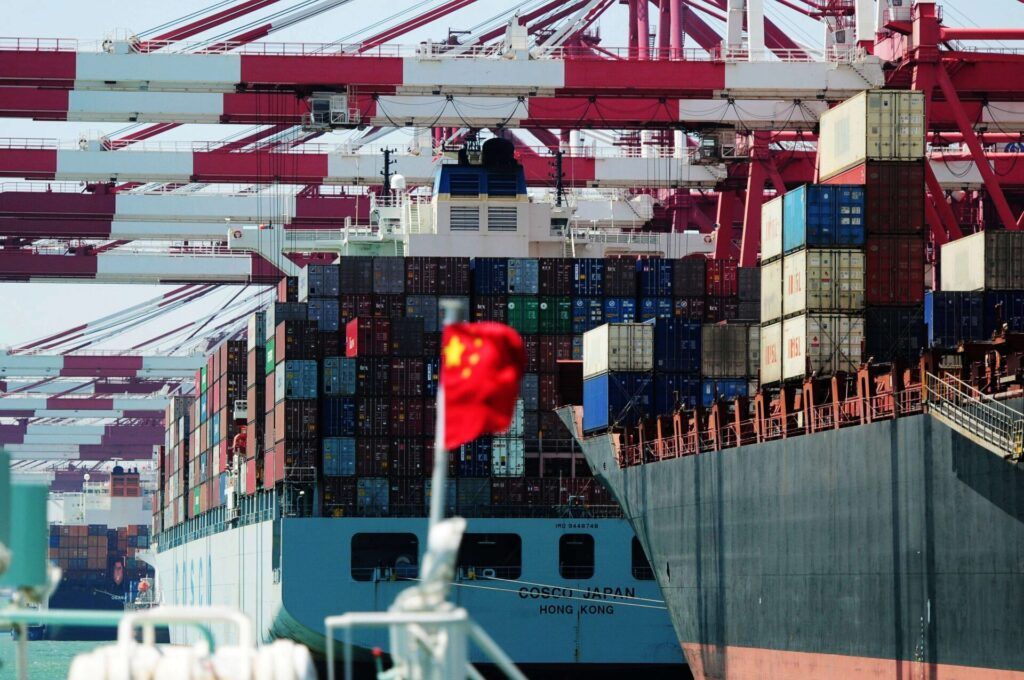How modern slavery—in China and elsewhere—undermines the fight against existential threats
By Erik English | October 10, 2024
 Fully-loaded container ships berth at a dock at the Port of Qingdao in Qingdao city. (depositphotos.com)
Fully-loaded container ships berth at a dock at the Port of Qingdao in Qingdao city. (depositphotos.com)
Since 2014, the Chinese Communist Party has perpetuated human rights abuses against Uyghurs and other Turkic Muslim minorities in the Xinjiang Uyghur Autonomous Region under the guise of anti-terrorism and anti-extremism—subjecting them to forced labor, mass detention, and land transfers.
Now, a new report reveals that some Chinese pharmaceutical products made using forced labor in the Xinjiang Uyghur Autonomous Region have reached the global marketplace. The report identifies three connections of international government agencies to Xinjiang-linked pharmaceuticals—the US Food and Drug Administration, the US Agency for International Development (through its contractor Chemonics International), and Japan’s Pharmaceuticals and Medical Devices Agency.
According to the Center for Advanced Defense Studies, which produced the report, Uyghurs detained in camps have been forced to undergo drug testing and medical procedures. Pharmaceutical companies are also relying on forced labor for manufacturing, and blood has been forcibly collected and sourced to companies using “healthy human plasma for drug production that particularly relates to autoimmune diseases and viruses.”
China is the largest producer of pharmaceutical ingredients in the world, and while Xinjiang is not a major contributor to the pharmaceutical sector, its share is increasing; the biomedical industry in Xinjiang has been growing at 20 percent per year and operations are expected to expand.
Several laws exist to prevent goods produced using forced labor from entering the United States or being purchased using US funds, but they rely on data transparency within supply chains to verify where and how goods are produced. The new report is an alarming reminder of the difficulty of avoiding human rights abuses in a globalized economy that relies on complex and increasingly opaque supply chains to deliver goods to people around the world. It is particularly worrying that key commodities for addressing existential risks—including climate change and disease treatment and prevention—are being produced via human rights abuses against vulnerable populations.
“Serious human rights violations.” The Uyghurs are a predominantly Muslim population of around 12 million people in China’s northwest Xinjiang region. Following brief periods of unrecognized independence backed by the Soviet Union, the region was annexed by China in 1949 following the Chinese Civil War, and its ongoing efforts to secede have caused tension. In the 1990s, separatist movements sought to include Xinjiang as part of a future state of East Turkestan, sometimes engaging in violence; the Chinese government began to characterize practicing Islam as “extremist” and used the 9/11 terrorist attacks to justify its repression of the Uyghur population as part of the so-called War on Terror.
Starting in 2014 and accelerating in 2017, residents of Xinjiang have been imprisoned without trial, and many have been relocated to “re-education camps.” Inside these camps, detainees have been forced to sing the praises of communism and Chinese President Xi Jinping and condemn the “three evil forces”: separatism, extremism, and terrorism. This conformity was enforced across Xinjiang using high tech surveillance and facial recognition software that allows the Chinese government to enforce “techno-repression” as a tool for maintaining control over the local population. An average of 1.3 million people were subjected to the re-education camps annually before international pressure led to the closure of the camps in 2019.
Today, forced labor and indoctrination is facilitated through a policy called “Poverty Alleviation Through Labor Transfer,” whereby Uyghurs are forcibly relocated from rural to industrial areas and compelled to work. Companies receive subsidies to employ Muslim and ethnic-minority workers, where they are “controlled and watched, receive Mandarin-Chinese language training, and undergo political indoctrination.”
In 2022, the United Nations Human Rights Office released a report concluding that China’s counter-terrorism and counter-extremism strategies had resulted in “serious human rights violations.” Fear of the re-education camps, some of which have now been fully converted into prisons, led many to sign up for the labor transfer program willingly.
A lack of data transparency. The Center for Advanced Defense Studies used drug production data, corporate records, and commercial trade data to verify which companies are in Xinjiang and which drugs are manufactured there. However, this data is limited because it doesn’t account for the volume of production. The data can reveal if a company has some presence in Xinjiang, but not how much it relies on that region for its production, unless the company is located only in Xinjiang. For example, the report found that 76 entities—including some producers of over-the-counter pain medications like acetaminophen, paracetamol, and amantadine—are operating exclusively in Xinjiang and are “uniquely high risk” of relying on forced labor. Data limitations have increased in recent years because of the US–China trade war.
Ian Stewart, an expert on export controls and sanctions, says China stopped publishing trade data because of “the US–China trade war and the Trump era tariffs.” Initially billed as an effort to reduce the trade deficit, increase job creation, and limit intellectual property theft, the trade war has only grown more tense, with concern over human rights violations in China becoming a flashpoint.
In 2021, Joe Biden signed the Uyghur Forced Labor Prevention Act into law, which prohibits goods produced using forced labor in China—particularly Xinjiang—from being imported to the US. The Department of Homeland Security maintains a list of known entities relying on forced labor in Xinjiang, which is regularly updated. The Center for Advanced Defense Studies report shows that the list will continue to grow.
It’s not just pharmaceuticals being produced using forced labor in Xinjiang, either. In early October, a Chinese steel manufacturer and a producer of artificial sweetener were added to the list. The US Labor Department has published warnings about many other products that rely on production in Xinjiang using forced labor—in particular, aluminum, cotton, lithium-ion batteries, and solar products.
Roughly a third of the world’s polysilicon, a key component in solar panels, is produced in Xinjiang using forced labor. The Biden administration has banned the imports of certain Chinese solar panels because of their connection to Xinjiang. Earlier this year, the administration increased tariffs on $18 billion of imports from China, with tariff rates on solar cells increasing from 25 percent to 50 percent.
The Center for Advanced Defense Studies points out that “forced labor creates artificial trade advantages for entities that are actively exploiting marginalized people,” allowing offenders to dominate the marketplace. The difficulty of auditing the work of Chinese firms makes it harder for downstream companies to verify the source of their products.
Last year, a report found that despite publicly cutting ties with China, many solar companies were still exposed to products from Xinjiang. The authors chided solar companies for their reliance and “resultant complicity” on polysilicon produced in Xinjiang. Some companies have created “untainted” supply chains, but the sector-wide trend to make supply chains less transparent prevents consumers from determining whether they are purchasing a product made using modern slavery.
Modern slavery. Mauritania was the last country to formally abolish slavery in 1981, but the practice has carried on in pernicious ways. In 2022, the Global Slavery Index and the International Labor Organization estimated that 50 million people were living in modern slavery, an increase of 10 million people from their 2016 estimates. Of those, 28 million people were forced laborers and 22 million were in forced marriage.
At least some of that increase likely stems from the COVID-19 pandemic, during which many people lost jobs and were vulnerable to exploitation. China has sought to “eradicate extreme poverty” since 2012, but its efforts were hampered by the factory shutdowns of the COVID-19 pandemic. The “Poverty Alleviation Through Labor” program was one way to alleviate those losses and lure companies from wealthier regions to poorer regions like Xinjiang. This increased production from Xinjiang, coupled with reduced transparency of supply chains, makes it difficult to root out forced labor from the global marketplace. A 2023 survey of procurement leaders found that only half believed they were making a difference in combatting modern slavery, citing a lack of transparency from their suppliers.
A notable example of this opacity was explained in the book Cobalt Red, Siddarth Kara’s detailed journey to several cobalt mines throughout the “Copperbelt” in the Democratic Republic of the Congo, where “artisanal” miners dig for cobalt under oppressive conditions. Historically, mines in the Congo provided uranium for the Manhattan project. Today, the country provides 70 percent of the world’s cobalt, a critical component in lithium-ion batteries that are currently powering the green energy transition.
In his book, Kara says, “All cobalt sourced from the DRC is tainted by various degrees of abuse, including slavery, child labor, forced labor, debt bondage, human trafficking, hazardous and toxic working conditions, pathetic wages, injury and death, and incalculable environmental harm.”
Many of Kara’s visits took place before the COVID-19 pandemic. During the pandemic, many foreign mining companies suspended their operations for staff safety. Unfortunately, demand for cobalt increased, and the only options were the artisanal miners. “Billions of people around the world relied more than ever on rechargeable devices to continue working or attending school from home,” Kara wrote. Returning in 2021, Kara found that conditions in many mines had deteriorated even further.
According to Kara, “the system was opaque and untraceable by design.”
Supply chain awareness. The Center for Advanced Defense Studies recommends adding four pharmaceutical production companies to the list of known entities that use forced labor: Sinopharm, Xinjiang Deyuan, Xinjiang Nuziline, and Xinjiang Huashidan. It also suggests federal agencies conduct assessments or their procurement policies to verify compliance with anti-forced labor sanctions and calls on the federal government to improve interagency coordination, strengthen trade agreements, and enhance bilateral and multilateral enforcement operations.
Stewart, the exports expert, explains that there are generally three goals for supply-chain measures and sanctions: behavior change, limiting access to inputs, and normative behavior. Behavior change is the hardest to accomplish and less likely to be successful than limiting access to inputs and resources. Using the North Korean nuclear program as an example, Stewart explains that it would be very difficult to prevent North Korea from wanting a nuclear weapon, but restricting the availability of a particular resource could prevent them from successfully developing one.
In terms of addressing supply chains and forced labor, Stewart is more optimistic about the third option, normative behavior: “We might not be able to change behavior or actually prevent them from doing whatever the specific thing is, but we can make sure that we’re not part of it—that we’re not a party to it.”
Together, we make the world safer.
The Bulletin elevates expert voices above the noise. But as an independent nonprofit organization, our operations depend on the support of readers like you. Help us continue to deliver quality journalism that holds leaders accountable. Your support of our work at any level is important. In return, we promise our coverage will be understandable, influential, vigilant, solution-oriented, and fair-minded. Together we can make a difference.
Keywords: China, Democratic Republic of the Congo, Uyghur, Xinjiang, cobalt, forced labor, modern slavery, polysilicon
Topics: Biosecurity, Climate Change















